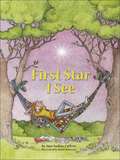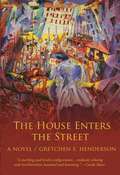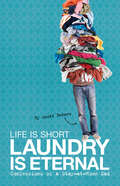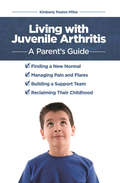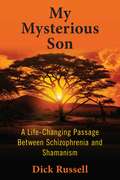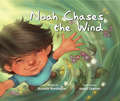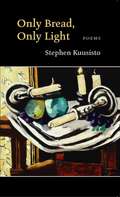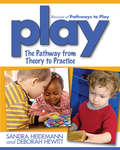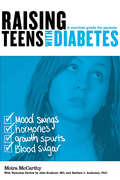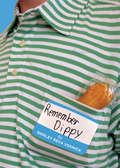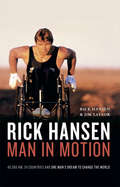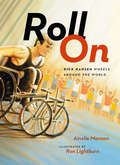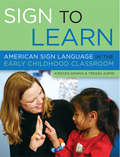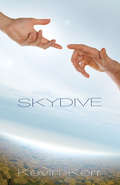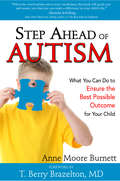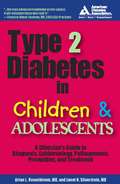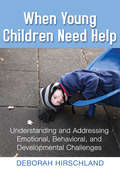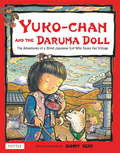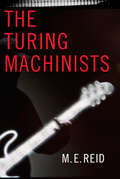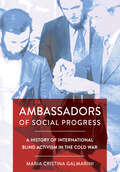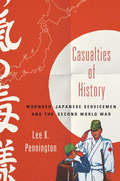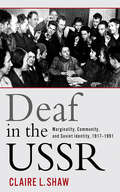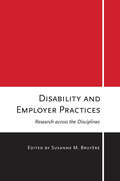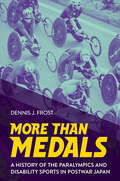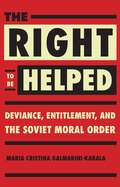- Table View
- List View
First Star I See
by Lynne Adamson Jaye Andras CaffreyA lively, enchanting story that wonderfully captures the daily ups and downs of being a child with attention deficit disorder through the adventures of Paige, a bright young girl whose inability to stay focused threatens to spoil her best efforts to win a school contest.
The House Enters the Street
by Gretchen Henderson"The House Enters the Street is beautifully written, confident, and complex. I was appreciative of its language and intelligence, mindfulness and scope."--Rikki Ducornet "A demanding and beautiful book, which tracks an exacting landscape with breathtaking inventiveness."--Mary Gordon "A startling and lovely configuration of stories, endlessly echoing and reverberating, haunted and haunting. Gretchen E. Henderson creates a sublime and mysterious music all her own."--Carole Maso It was all about the fruits of labors, not only on land: at sea. Faar's life began at sea. Waves rolled outside his window, where he watched watery horizons. His father had disappeared on a voyage to terra incognita, where horned narwhales swam under ice, where profit lulled into frozen floes. The young Faar began to dream of cloud lagoons, bellied sails, and wind. The wayfaring trait had been inherited. He decided to wander. Cousins on the other side of the world sent him a letter to marry their eldest daughter: S-v-a-n H-a-r-d-t. I-o-w-a, they wrote, without mentioning the distance between bordering seas. Faar assumed oceans existed near their home. He was young, then. This beautiful novel is simultaneously a love letter to the arts and a complex interweaving of characters, stories, landscapes. Scandinavian immigrants in Iowa migrate towards war. A photographer in Arkansas returns to California to repair her family after a devastating fire. Stories unfold, modulating and resonating. This intricate, moving book reminds us of the art a novel can be. Gretchen E. Henderson is a Mellon Postdoctoral Fellow in Writing and Humanistic Studies at Massachusetts Institute of Technology. Working at the intersection of literature, art history, museum studies, disability studies, and music, her creative and critical work explores aesthetics of deformity, museology as narrative strategy, poetics of embodiment, and literary appropriations of music. Her writings have appeared in a number of journals and anthologies, including The Kenyon Review, The Iowa Review, The Sourthern Review, and The &NOW Awards: The Best Innovative Writing. Her first novel Galerie de Difformité was awarded the 2011 Madeleine P. Plonskar Emerging Writer's Prize from &NOW Books. Other works include a critical study of literary appropriations of music, On Marvellous Things Heard (Green Lantern Press), and a poetry chapbook engaging cartographic history, Wreckage: By Land & By Sea (Dancing Girl Press). At MIT, she is working on Ugliness: A Cultural History while continuing the collaborative deformation of her Galerie de Difformité. She lives in Cambridge, Massachusetts.
Life Is Short, Laundry Is Eternal
by Scott Benner2013 Mom's Choice Awards® WinnerMEN: Ever wonder about stay-at-home dads? What in the name of testosterone do they DO all day with those kids? I mean, are they really men at all, or are they some strange, invasive alien species, sent to Earth to defy and destroy all gender stereotypes?.WOMEN: Ever dream about stay-at-home dads? Do they really wash clothes, pick up after themselves, take great care of your kids, and have dinner waiting for you when you get home? There must be horrible, secret downside that they don't warn you about, right?.Life Is Short, Laundry Is Eternal provides a rare glimpse into the natural habitat of this most mysterious and splendid of creatures, the North American Stay-at-Home Father (Paternus domesticus). Learn what motivates a man to pursue this noble occupation. Discover the countless joys and periodic sorrows that come with raising a family..Witness the life and family of Scott Benner, author, activist, humorist, and 12-year stay-at-home dad. When Scott's daughter, Arden, was diagnosed with type 1 diabetes at the age of two, his world took a sharp turn, but his positive outlook on life did not waver..Scott's colloquial wisdom will warm your heart while it challenges your ideas about parenting and gender roles in today's household. Written from a truly unique point of view in a style both poignant and playful, Life Is Short, Laundry Is Eternal is an honest portrait of the modern family.
Living with Juvenile Arthritis
by Kimberly Poston MillerParenting a child with a chronic illness is not simply a full-time job; it's an all-time job.Quite unlike most other jobs in life, your first day as the parent of a child with juvenile arthritis usually begins with little or no training, no orientation, and no helpful coworkers or encouraging boss to lead you through the ropes. You'll be required to gain confidence and comfort in this job, day by day, through your own research and discoveries, your intuition, your inner strength, and your enduring love for your child.Living with Juvenile Arthritis: A Parent's Guide provides support to parents and caregivers of children with juvenile arthritis through helpful tips and guidance from a parent who has successfully navigated the challenges of raising two children with juvenile idiopathic arthritis.Allow author Kimberly Poston Miller to help you and your family find your path. Learn more about arthritis, its symptoms, diagnosis scenarios, treatment options, managing pain, and handling flare-ups. Discover strategies for dealing with the unpredictability and individuality of your child's condition. Build a support team of health-care professionals, cultivate healthy relationships within your family, and focus on what's most important-raising a happy, well-adjusted child.
My Mysterious Son
by Dick RussellWhat does a father do when hope is gone that his only son can ever lead anything close to a "normal" life? That's the question that haunted Dick Russell in the fall of 2011, when his son, Franklin, was thirty-two. At the age of seventeen, Franklin had been diagnosed with schizophrenia. For years he spent time in and out of various hospitals, and even went through periods of adamantly denying that Dick was actually his father.A mixed-race child, Franklin was handsome, intelligent, and sensitive until his mental illness suddenly took control. After spending the ensuing years trying to build some semblance of a normal father-son relationship, Dick was invited with his son, out of the blue, to witness the annual wildlife migration on Africa's Serengeti Plain. Seizing this potential opportunity to repair the damage that both had struggled with, after going through two perilous nights together in Tanzania, ultimately the two-week trip changed both of their lives.Desperately seeking an alternative to the medical model's medication regimen, the author introduces Franklin to a West African shaman in Jamaica. Dick discovers Franklin's psychic capabilities behind the seemingly delusional thought patterns, as well as his artistic talents. Theirs becomes an ancestral quest, the journey finally taking them to the sacred lands of New Mexico and an indigenous healer. For those who understand the pain of mental illness as well the bond between a parent and a child, My Mysterious Son shares the intimate and beautiful story of a father who will do everything in his power to repair his relationship with a young man damaged by mental illness.
Noah Chases the Wind
by Michelle Worthington Joseph CowmanNoah knew he was different. He could see things that others couldn't, like the patterns in the dust that floated down on sunbeams.Noah is different. He sees, hears, feels, and thinks in ways that other people don't always understand, and he asks a lot of questions along the way. Noah loves science, especially the weather. His books usually provide him with the answers he needs, until one day, there's one question they don't answer-and that is where Noah's windy adventure begins.Filled with rich, sweeping illustrations, this picture book celebrates the inquisitive nature of all children, including those on the autism spectrum, who cannot stop asking a question until an answer has been unearthed.The book contains a page of information for parents, caregivers, and educators about the importance of helping children feel good about their differences and know that being different is okay.Michelle Worthington was born in Brisbane, Queensland, and has lived there all her life. She is much-published author in Australia.Joseph Cowman lives and paints in the hills and valleys of suburban Idaho. He is a long-standing member of the Society of Children's Books Writers and Illustrators. He is the illustrator of six other Redleaf Lane books, including most recently, The Amazing Erik and Rita and the Firefighters.
Only Bread, Only Light
by Stephen KuusistoWith this, his first collection of poetry, Stephen Kuusisto (author of the memoir Planet of the Blind) explores blindness and curiosity, loneliness and the found instruments of continuation. Exploiting the seeming contradiction of poetry's reliance upon visual imagery with Kuusisto's own sightlessness, these poems cultivate a world of listening: to the natural world, to the voices of family and strangers, to music and the words of great writers and thinkers.Kuusisto has written elsewhere, "I see like a person who looks through a kaleidoscope; my impressions of the world at once beautiful and largely useless." So it is no surprise that in his poems mortal vision is uncertain, supported only by the ardor of imagination and the grace of lyric surprise. Sensually rich and detailed, Kuusisto's poems are humorous, complex, and intellectually engaged. This collection reveals a major new poetic talent."Only Bread, Only Light"At times the blind see light,And that moment is the Sistine ceiling,Grace among buildings--no one asksFor it, no one asks.After all, this is solitude,Daylight's finger,Blake's angelParting willow leaves.I should know better.Get with the businessOf walking the lovely, satisfied,Indifferent weather--Bread bakingOn Arthur AvenueThis first warm day of June.I stand on the cornerFor priceless seconds.Now everything to me falls shadowStephen Kuusisto's 1998 memoir Planet of the Blind received tremendous international attention, including appearances on Oprah, Dateline, and Talk of the Nation. The New York Times named it a "Notable Book of the Year" and praised it as "a book that makes the reader understand the terrifying experience of blindness, a book that stands on its own as the lyrical memoir of a poet." A spokesperson for Guiding Eyes for the Blind, Kuusisto teaches at Ohio State University.
Play
by Deborah Hewitt Sandra HeidemannPlay skills are life skills; as children develop them, they also learn important social skills that they will use throughout their lives. Teachers will find successful strategies for implementing changes in the classroom to enhance the environment for play and techniques to help support children's development. This is the revised edition of the well-respected and relied-upon handbook Pathways to Play. Play contains activity ideas that encourage play skills, checklists to help identify where children are having problems, specific teaching strategies, and assessment options. This new edition also examines how play theory translates into practice.
Raising Teens with Diabetes
by Moira Mccarthy Jake Kushner Barbara J. Anderson2013 Mom's Choice Awards® WinnerHormones. Growth spurts. Mood swings. All combined with blood sugars..The teen years with diabetes on board are a challenging time for parents and anyone who cares about a child with diabetes. Raising Teens with Diabetes: A Survival Guide for Parents, by well-known diabetes mom, author, and advocate Moira McCarthy, is a no-nonsense, honest approach at not just surviving but thriving in those years, from a mom who has been there..Raising Teens with Diabetes is a must-have resource for anyone navigating the waters of parenting a child with diabetes.
Remember Dippy
by Shirley Reva Vernick<P>Johnny's plans fly out the window when he finds out his single mother is leaving town for the summer. She has a breakthough job in upstate New York. He can live with his Aunt Collette but only on the condition that he "help out with" his autistic older cousin, Remember. <P>Yup, you heard it right: Remember Dippy. That's his cousin's name-and Remember is a gawky awkward kid with some pretty strange habits, like repeating back almost everything Johnny says and spending hours glued to the weather channel. <P>Johnny's premonitions of disaster appear at first to come to cringeworthy fruition, but when the two boys save a bully from drowning, salvage the pizzeria guy's romance, and share girl troubles, Johnny ends up having the summer of his life. <P><b>Winner of the Dolly Gray Children's Literature Award & 2014 Skipping Stones Honor Award</b>
Rick Hansen: Man in Motion
by Jim Taylor Rick HansenIn 1973, Rick Hansen was a carefree teenager hitchhiking home from a fishing trip, a kid who lived and breathed sports. But after the truck he was riding in went out of control and crashed, Hansen was left a paraplegic.<P><P> For some people that could have been the end. For Rick Hansen it was the beginning of a story that is at once sad and funny, heartbreaking and inspirational.Hansen takes you from the first painful days and frightening nights in hospital, through the gritty process of rehabilitation, to his return to competition as a world champion of wheelchair sports. It is the story of the Man in Motion tour-Rick Hansen's incredible 24,901.55-mile wheelchair journey through 34 countries around the world. It is also the love story of Hansen and his wife, Amanda, a physiotherapist whom Hansen calls his "lifeline." And it is a success story-Rick Hansen has raised millions of dollars for spinal cord research, rehabilitation and wheelchair sports as well as raised awareness about the disabled.
Roll On
by Ainslie Manson Ron LightburnAs Rick Hansen wheels around the globe on his incredible Man in Motion World Tour, the children he meets are encouraged to dream their own dreams and work to make them come true. Readers also discover little-known facts about the great journey. They learn that Rick wheeled the equivalent of three marathons a day and went through 94 pairs of gloves. And they learn about the gift of a song that Rick and his team sang or hummed mile after mile. The lively text and enchanting illustrations combine to bring to life Rick's amazing feat and the impact it has had on children everywhere. Roll On is an inspirational story for any child who has had to overcome a disability, has a friend or sibling who lives with a disability, or who has big dreams for life.
Sign to Learn
by Kirsten Dennis Tressa AzpiriEveryone is talking about signing with young children. As a form of early communication for infants and toddlers, or as a transitioning tool for children just beginning to speak, the benefits of signing with hearing children are endless.Sign to Learn is the first complete introduction to sign language curriculum for hearing preschoolers. In this unique resource, you will learn how to integrate American Sign Language (ASL) into your classroom to enhance the academic, social, and emotional development of children, and how to respectfully introduce children to Deaf culture.This comprehensive, fully illustrated curriculum contains captivating activities and lesson plans grouped by themes, including feelings, food, seasons, animals, songs, and families. Sign to Learn also contains strategies for using sign language with children with special needs and in multilingual classrooms, and it describes how ASL can assist you in developing a literacy program and in managing your classroom.Information-rich appendices include a thorough ASL illustration index, sample letters to families, and resources for further reading.
Skydive
by Kevin KerrHaving grown apart after a traumatic and defining moment in their youth, two brothers reconnect to fulfill a life-long ambition to go skydiving. Skydive explores the world of dreams and imagination: the universal human desire to push beyond our physical limitations and to fly.
Step Ahead of Autism
by Anne Moore Burnett T. Berry BrazeltonReaders will learn how to transform themselves-their intentions, beliefs, attitudes, and reactions-so that they have more power over how their child does. Provides the reader with step-by-step, attainable, parent-tested exercises, techniques, and tips on how to step up to the challenge and become the parents they need to be to guide their child to a positive outcome.
Type 2 Diabetes in Children and Adolescents
by Arlan L. Rosenbloom Janet H. SilversteinEpidemiology of type 2 diabetes in youth, including evidence for and magnitude of the epidemic; pathophysiology in youth, case-finding criteria, and when to consider the possibility of type 2; and how to diagnose and treat diabetes in children and adolescents.
When Young Children Need Help
by Deborah HirschlandLearn how to reach children who need special help.Almost anyone who works with 3- to 6-year-olds knows what it feels like to spend time with youngsters who are particularly puzzling or hard to help. When Young Children Need Help examines how early childhood educators can make sense of what is going on for such children and then use that understanding to help promote growth and mastery. Written for child care center staff, family child care providers, preschool teachers, and pre-service teachers, this book can be useful to any adult who wants to learn more about reaching the most troubling children in his or her care.When Young Children Need Help provides a framework for understanding a range of emotional, behavioral, and developmental challenges. It explores a process through which early childhood teachers and providers can translate their growing understanding of a child's difficulties into sensible goals for intervention. The author lays out practical strategies that help kids connect and communicate with ease, focus their attention, manage their bodies and their feelings, engage in constructive problem-solving, and experience themselves as successful friends and learners. The book suggests approaches for collaborating with parents and other caregivers and emphasizes that even when a child needs outside services and supports, what goes on in school or care remains central to making progress.Ranging from the classroom to the playground and back again, When Young Children Need Help offers its perspectives and strategies through highly engaging stories that bring challenging kids alive in all their quirky uniqueness.
Yuko-chan and the Daruma Doll: The Adventures of a Blind Japanese Girl Who saves Her Village
by Sunny SekiYuko-chan and the Daruma Doll, a gorgeous multicultural children's book by author/illustrator Sunny Seki, takes readers on a journey into ancient Japan and the story behind the famous Daruma Doll.<P><P>Yuko-chan, an adventurous blind orphan, is able to do amazing things. She confronts a burglar in the dead of night, and crosses treacherous mountain passes to deliver food to hungry people. During her travels, Yuko-chan trips and tumbles down a snowy cliff. She discovers a strange thing as she waits for help: her tea gourd, regardless of how she drops it, always lands right-side-up. The tea has frozen in the bottom of the gourd! Inspired by this, she creates the famous Daruma doll toy, which rights itself when tipped--a true symbol of resilience.Thanks to Yuko-chan's invention, the villagers are able to earn a living and feed themselves by selling the dolls. Yuko-chan never gave up, no matter the obstacles she faced, and the Daruma doll is a charming reminder of the power of perseverance.
The Turing Machinists
by M. E. ReidAt seventeen, Del’s world seems to be falling apart. He’s managed his Asperger’s well, has a solid group of friends in his special needs class at school, and even manages to get by among people who don’t understand his brand of communication. But his parents are splitting up, and Del is certain he can save his family. To do it, he decides he needs to live out his father’s dream of musical stardom. He gets together with some of his friends and they form The Turing Machinists, an all-Asperger’s rock band. But they’ll need help – and Del seeks that help in the form of his neighbour, a reclusive rock legend who would rather have nothing to do with the music scene.
Ambassadors of Social Progress: A History of International Blind Activism in the Cold War (NIU Series in Slavic, East European, and Eurasian Studies)
by Maria Cristina GalmariniAmbassadors of Social Progress examines the ways in which blind activists from the Soviet Union and Eastern Europe entered the postwar international disability movement and shaped its content and its course. Maria Cristina Galmarini shows that the international work of socialist blind activists was defined by the larger politics of the Cold War and, in many respects, represented a field of competition with the West in which the East could shine. Yet, her study also reveals that socialist blind politics went beyond propaganda. When socialist activists joined the international blind movement, they initiated an exchange of experiences that profoundly impacted everyone involved. Not only did the international blind movement turn global disability welfare from philanthropy to self-advocacy, but it also gave East European and Soviet activists a new set of ideas and technologies to improve their own national movements. By analyzing the intersection of disability and politics, Ambassadors of Social Progress enables a deeper, bottom-up understanding of cultural relations during the Cold War. Galmarini significantly contributes to the little-studied history of disability in socialist Europe, and ultimately shows that disability activism did not start as an import from the West in the post-1989 period, but rather had a long and meaningful tradition that was rooted in the socialist system of welfare and needed to be reinvented when this system fell apart.
Casualties of History: Wounded Japanese Servicemen and the Second World War (Studies of the Weatherhead East Asian Institute, Columbia University)
by Lee K. PenningtonThousands of wounded servicemen returned to Japan following the escalation of Japanese military aggression in China in July 1937. Tens of thousands would return home after Japan widened its war effort in 1939. In Casualties of History, Lee K. Pennington relates for the first time in English the experiences of Japanese wounded soldiers and disabled veterans of Japan's "long" Second World War (from 1937 to 1945). He maps the terrain of Japanese military medicine and social welfare practices and establishes the similarities and differences that existed between Japanese and Western physical, occupational, and spiritual rehabilitation programs for war-wounded servicemen, notably amputees. To exemplify the experience of these wounded soldiers, Pennington draws on the memoir of a Japanese soldier who describes in gripping detail his medical evacuation from a casualty clearing station on the front lines and his medical convalescence at a military hospital. Moving from the hospital to the home front, Pennington documents the prominent roles adopted by disabled veterans in mobilization campaigns designed to rally popular support for the war effort. Following Japan’s defeat in August 1945, U.S. Occupation forces dismantled the social welfare services designed specifically for disabled military personnel, which brought profound consequences for veterans and their dependents. Using a wide array of written and visual historical sources, Pennington tells a tale that until now has been neglected by English-language scholarship on Japanese society. He gives us a uniquely Japanese version of the all-too-familiar story of soldiers who return home to find their lives (and bodies) remade by combat.
Deaf in the USSR: Marginality, Community, and Soviet Identity, 1917-1991
by Claire L. ShawIn Deaf in the USSR, Claire L. Shaw asks what it meant to be deaf in a culture that was founded on a radically utopian, socialist view of human perfectibility. Shaw reveals how fundamental contradictions inherent in the Soviet revolutionary project were negotiated—both individually and collectively— by a vibrant and independent community of deaf people who engaged in complex ways with Soviet ideology.Deaf in the USSR engages with a wide range of sources from both deaf and hearing perspectives—archival sources, films and literature, personal memoirs, and journalism—to build a multilayered history of deafness. This book will appeal to scholars of Soviet history and disability studies as well as those in the international deaf community who are interested in their collective heritage. Deaf in the USSR will also enjoy a broad readership among those who are interested in deafness and disability as a key to more inclusive understandings of being human and of language, society, politics, and power.
Disability and Employer Practices: Research across the Disciplines
by Susanne M. BruyèreThis book is about the employment of people with disabilities in the United States and the important role of employer practices. Nearly one in five people report some form of disability, and they are only half as likely to be employed as those without disabilities. With the aging workforce and returning military veterans both contributing to increasing number of disabilities in the workplace, there is an urgent need for better ways to address continuing employment disparities for people with disabilities. Examining employer behaviors is critical to changing this trend. It is essential to understand the factors that motivate employers to engage this workforce and which specific practices are most effective. Disability and Employer Practices features research-based documentation of workplace policies and practices that result in the successful recruitment, retention, advancement, and inclusion of individuals with disabilities. The Cornell team whose work is featured in this book drew from multiple disciplines, data sources, and methodologies to learn where employment disparities for people with disabilities occur and to identify workplace policies and practices that might remediate them. The contributors include individuals with expertise in the fields of business, economics, education, environmental design and analysis, human resources, management, industrial/organizational psychology, public health, rehabilitation psychology, research methods, survey design, educational measurement, statistics, and vocational rehabilitation counseling. Contributors Linda Barrington, Institute for Compensation Studies, ILR School, Cornell University Susanne M. Bruyère, K. Lisa Yang and Hock E. Tan Institute on Employment and Disability, ILR School, Cornell University Hassan Enayati, K. Lisa Yang and Hock E. Tan Institute on Employment and Disability, ILR School, Cornell University William A. Erickson, K. Lisa Yang and Hock E. Tan Institute on Employment and Disability, ILR School, Cornell University Kevin Hallock, Institute for Compensation Studies, ILR School, Cornell University Arun Karpur, K. Lisa Yang and Hock E. Tan Institute on Employment and Disability, ILR School, Cornell University Lisa Nishii, Human Resource Studies, ILR School, Cornell University Ellice Switzer, K. Lisa Yang and Hock E. Tan Institute on Employment and Disability, ILR School, Cornell University Sarah von Schrader, K. Lisa Yang and Hock E. Tan Institute on Employment and Disability, ILR School, Cornell University Sara Van Looy, K. Lisa Yang and Hock E. Tan Institute on Employment and Disability, ILR School, Cornell University
More Than Medals: A History of the Paralympics and Disability Sports in Postwar Japan
by Dennis J. FrostHow does a small provincial city in southern Japan become the site of a world-famous wheelchair marathon that has been attracting the best international athletes since 1981?In More Than Medals, Dennis J. Frost answers this question and addresses the histories of individuals, institutions, and events—the 1964 Paralympics, the FESPIC Games, the Ōita International Wheelchair Marathon, the Nagano Winter Paralympics, and the 2021 Tokyo Summer Games that played important roles in the development of disability sports in Japan. Sporting events in the postwar era, Frost shows, have repeatedly served as forums for addressing the concerns of individuals with disabilities. More Than Medals provides new insights on the cultural and historical nature of disability and demonstrates how sporting events have challenged some stigmas associated with disability, while reinforcing or generating others.Frost analyzes institutional materials and uses close readings of media, biographical sources, and interviews with Japanese athletes to highlight the profound—though often ambiguous—ways in which sports have shaped how postwar Japan has perceived and addressed disability. His novel approach highlights the importance of the Paralympics and the impact that disability sports have had on Japanese society.
The Right to Be Helped: Deviance, Entitlement, and the Soviet Moral Order (NIU Series in Slavic, East European, and Eurasian Studies)
by Maria Galmarini"Doesn't an educated person—simple and working, sick and with a sick child—doesn't she have the right to enjoy at least the crumbs at the table of the revolutionary feast?" Disabled single mother Maria Zolotova-Sologub raised this question in a petition dated July 1929 demanding medical assistance and a monthly subsidy for herself and her daughter. While the welfare of able-bodied and industrially productive people in the first socialist country in the world was protected by a state-funded insurance system, the social rights of labor-incapacitated and unemployed individuals such as Zolotova-Sologub were difficult to define and legitimize. The Right to Be Helped illuminates the ways in which marginalized members of Soviet society understood their social rights and articulated their moral expectations regarding the socialist state between 1917 and 1950. Maria Galmarini-Kabala shows how definitions of state assistance and who was entitled to it provided a platform for policymakers and professionals to engage in heated debates about disability, gender, suffering, and productive and reproductive labor. She explores how authorities and experts reacted to requests for support, arguing that responses were sometimes characterized by an enlightened nature and other times by coercive discipline, but most frequently by a combination of the two. By focusing on the experiences of behaviorally problematic children, unemployed single mothers, and blind and deaf adults in several major urban centers, this important study shows that the dialogue over the right to be helped was central to defining the moral order of Soviet socialism. It will appeal to scholars and students of Russian history, as well as those interested in comparative disabilities and welfare studies.
